Deck 7: Applications of Integration
Question
Question
Question
Question
Question
Question
Question
Question
Question
Question
Question
Question
Question
Question
Question
Question
Question
Question
Question
Question
Question
Question
Question
Question
Question
Question
Question
Question
Question
Question
Question
Question
Question
Question
Question

Unlock Deck
Sign up to unlock the cards in this deck!
Unlock Deck
Unlock Deck
1/35
Play
Full screen (f)
Deck 7: Applications of Integration
1
Set up and evaluate the integral that gives the volume of the solid formed by revolving the region bounded by  axis.
axis.
A)
B)
C)
D)
E)
 axis.
axis.A)

B)

C)

D)

E)


2
Concrete sections for the new building have the dimensions (in meters) and shape as shown in the figure (the picture is not necessarily drawn to scale).One cubic meter of concrete
Weighs 4320 pounds.Find the weight of the section.Round your answer to the nearest pound.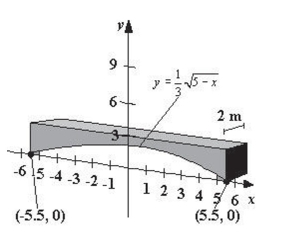
A)268,492 pounds
B)263,654 pounds
C)216,267 pounds
D)242,187 pounds
E)251,865 pounds
Weighs 4320 pounds.Find the weight of the section.Round your answer to the nearest pound.

A)268,492 pounds
B)263,654 pounds
C)216,267 pounds
D)242,187 pounds
E)251,865 pounds
242,187 pounds
3
Find the area of the region bounded by the graphs of the function 
 Round your answer to three decimal places.
Round your answer to three decimal places.
A)0.260
B)0.289
C)0.416
D)0.139
E)0.462

 Round your answer to three decimal places.
Round your answer to three decimal places.A)0.260
B)0.289
C)0.416
D)0.139
E)0.462
0.260
4
Suppose that  model the revenue (in billions of dollars) for a large corporation.The model
model the revenue (in billions of dollars) for a large corporation.The model  gives projected annual revenues from 2008 through
gives projected annual revenues from 2008 through
2015, with corresponding to 2008, and
corresponding to 2008, and  gives projected revenues if there is a decrease in the
gives projected revenues if there is a decrease in the
Rate of growth of corporate sales over the period.Approximate the total reduction in revenue if
Corporate sales are actually closer to the model Round your answer to three decimal places.
Round your answer to three decimal places.
A)$3.570 billion
B)$24.990 billion
C)$19.763 billion
D)$29.645 billion
E)$12.495 billion
 model the revenue (in billions of dollars) for a large corporation.The model
model the revenue (in billions of dollars) for a large corporation.The model  gives projected annual revenues from 2008 through
gives projected annual revenues from 2008 through2015, with
 corresponding to 2008, and
corresponding to 2008, and  gives projected revenues if there is a decrease in the
gives projected revenues if there is a decrease in theRate of growth of corporate sales over the period.Approximate the total reduction in revenue if
Corporate sales are actually closer to the model
 Round your answer to three decimal places.
Round your answer to three decimal places.A)$3.570 billion
B)$24.990 billion
C)$19.763 billion
D)$29.645 billion
E)$12.495 billion

Unlock Deck
Unlock for access to all 35 flashcards in this deck.
Unlock Deck
k this deck
5
Find the area of the region bounded by the graphs of the algebraic functions. 
A)
B)
C)
D)
E)

A)

B)

C)

D)

E)


Unlock Deck
Unlock for access to all 35 flashcards in this deck.
Unlock Deck
k this deck
6
Concrete sections for the new building have the dimensions (in meters) and shape as shown in the figure (the picture is not necessarily drawn to scale).Find the area of the face of the
Section superimposed on the rectangular coordinate system.Round your answer to three decimal
Places.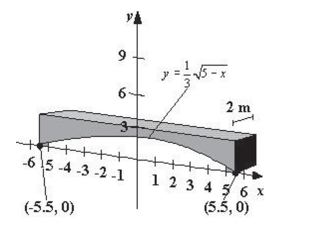
A)25.031
B)31.075
C)29.151
D)30.515
E)28.031
Section superimposed on the rectangular coordinate system.Round your answer to three decimal
Places.

A)25.031

B)31.075

C)29.151

D)30.515

E)28.031


Unlock Deck
Unlock for access to all 35 flashcards in this deck.
Unlock Deck
k this deck
7
Find the area of the region bounded by equations by integrating (i) with respect to  and (ii) with respect to y.
and (ii) with respect to y. 
A)
B)
C)
D)
E)
 and (ii) with respect to y.
and (ii) with respect to y. 
A)

B)

C)

D)

E)


Unlock Deck
Unlock for access to all 35 flashcards in this deck.
Unlock Deck
k this deck
8
Find the area of the region bounded by the graphs of the equations. 
A)
B)
C)
D)
E)

A)

B)

C)

D)

E)


Unlock Deck
Unlock for access to all 35 flashcards in this deck.
Unlock Deck
k this deck
9
Find the area of the region bounded by the graphs of the algebraic functions. 
A)
B)
C)
D)
E)

A)

B)

C)

D)

E)


Unlock Deck
Unlock for access to all 35 flashcards in this deck.
Unlock Deck
k this deck
10
Set up the definite integral that gives the area of the region bounded by the graph of 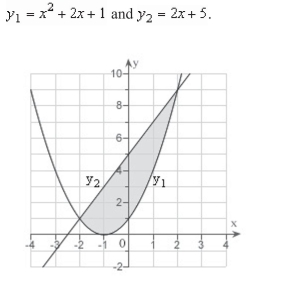
A)
B)
C)
D)
E)

A)

B)

C)

D)

E)


Unlock Deck
Unlock for access to all 35 flashcards in this deck.
Unlock Deck
k this deck
11
Find the area of the region bounded by the equations by integrating (i) with respect to x and
(ii) with respect to y.
A)
B)
C)
D)
E)
(ii) with respect to y.

A)

B)

C)

D)

E)


Unlock Deck
Unlock for access to all 35 flashcards in this deck.
Unlock Deck
k this deck
12
The chief financial officer of a company reports that profits for the past fiscal year were  million.The officer predicts that profits for the next 7 years will grow at a continuous
million.The officer predicts that profits for the next 7 years will grow at a continuous
Annual rate somewhere between and 6%.Estimate the cumulative difference in total profit over
and 6%.Estimate the cumulative difference in total profit over
The 7 years based on the predicted range of growth rates.Round your answer to three decimal places.
A)$445.736 billion
B)$30.221 billion
C)$7.023 billion
D)$18.710 billion
E)$57.880 billion
 million.The officer predicts that profits for the next 7 years will grow at a continuous
million.The officer predicts that profits for the next 7 years will grow at a continuousAnnual rate somewhere between
 and 6%.Estimate the cumulative difference in total profit over
and 6%.Estimate the cumulative difference in total profit overThe 7 years based on the predicted range of growth rates.Round your answer to three decimal places.
A)$445.736 billion
B)$30.221 billion
C)$7.023 billion
D)$18.710 billion
E)$57.880 billion

Unlock Deck
Unlock for access to all 35 flashcards in this deck.
Unlock Deck
k this deck
13
Set up and evaluate the integral that gives the volume of the solid formed by revolving the region bounded by  in the first quadrant about the -axis.
in the first quadrant about the -axis.
A)
B)
C)
D)
E)
 in the first quadrant about the -axis.
in the first quadrant about the -axis.A)

B)

C)

D)

E)


Unlock Deck
Unlock for access to all 35 flashcards in this deck.
Unlock Deck
k this deck
14
The surface of a machine part is the region between the graphs of  and
and  as shown in the figure.Find k if the parabola is tangent to the graph of
as shown in the figure.Find k if the parabola is tangent to the graph of  .Round your answer to three decimal places.
.Round your answer to three decimal places. 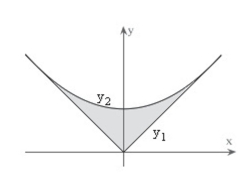
A)3.125
B)0.160
C)0.080
D)0.320
E)6.250
 and
and  as shown in the figure.Find k if the parabola is tangent to the graph of
as shown in the figure.Find k if the parabola is tangent to the graph of  .Round your answer to three decimal places.
.Round your answer to three decimal places. 
A)3.125
B)0.160
C)0.080
D)0.320
E)6.250

Unlock Deck
Unlock for access to all 35 flashcards in this deck.
Unlock Deck
k this deck
15
Find the area of the region bounded by the graphs of the function  Round your answer to three decimal places.
Round your answer to three decimal places.
A)20.723
B)11.182
C)6.238
D)10.362
E)22.364
 Round your answer to three decimal places.
Round your answer to three decimal places.A)20.723
B)11.182
C)6.238
D)10.362
E)22.364

Unlock Deck
Unlock for access to all 35 flashcards in this deck.
Unlock Deck
k this deck
16
If the accumulation function 
A)
B)
C)
D)
E)

A)

B)

C)

D)

E)


Unlock Deck
Unlock for access to all 35 flashcards in this deck.
Unlock Deck
k this deck
17
Find the area of the region bounded by the graphs of the algebraic functions. 
A)
B)
C)
D)
E)

A)

B)

C)

D)

E)


Unlock Deck
Unlock for access to all 35 flashcards in this deck.
Unlock Deck
k this deck
18
Find the area of the region bounded by the graphs of the equations. 
A)
B)
C)
D)
E)

A)

B)

C)

D)

E)


Unlock Deck
Unlock for access to all 35 flashcards in this deck.
Unlock Deck
k this deck
19
Find the area of the region bounded by the graphs of the algebraic functions. 
A)
B)
C)
D)
E)

A)

B)

C)

D)

E)


Unlock Deck
Unlock for access to all 35 flashcards in this deck.
Unlock Deck
k this deck
20
The surface of a machine part is the region between the graphs of  and
and  as shown in the figure.Find the area of the surface of the machine part.Round your answer to five decimal places.
as shown in the figure.Find the area of the surface of the machine part.Round your answer to five decimal places. 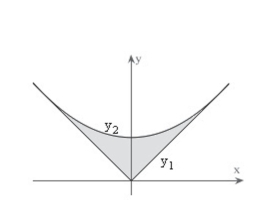
A)1.66667
B)0.41667
C)0.01333
D)33.33333
E)8.33333
 and
and  as shown in the figure.Find the area of the surface of the machine part.Round your answer to five decimal places.
as shown in the figure.Find the area of the surface of the machine part.Round your answer to five decimal places. 
A)1.66667
B)0.41667
C)0.01333
D)33.33333
E)8.33333

Unlock Deck
Unlock for access to all 35 flashcards in this deck.
Unlock Deck
k this deck
21
Find the volume of the solid generated by revolving the region bounded by the graphs of the equations about the  axis.
axis. 
A)
B)
C)
D)
E)
 axis.
axis. 
A)

B)

C)

D)

E)


Unlock Deck
Unlock for access to all 35 flashcards in this deck.
Unlock Deck
k this deck
22
Find the volume of the solid generated by revolving the region bounded by the graphs of the equations about the line 

A)
B)
C)
D)
E)


A)

B)

C)

D)

E)


Unlock Deck
Unlock for access to all 35 flashcards in this deck.
Unlock Deck
k this deck
23
Find the volume of the solid generated by revolving the region bounded by the graphs of the equations about the  axis.
axis. 
A)
B)
C)
D)
E)
 axis.
axis. 
A)

B)

C)

D)

E)


Unlock Deck
Unlock for access to all 35 flashcards in this deck.
Unlock Deck
k this deck
24
Find the volume of the solid generated by revolving the region bounded by the graphs of the equations about the given lines. 
A)
B)
C)
D)
E)

A)

B)

C)

D)

E)


Unlock Deck
Unlock for access to all 35 flashcards in this deck.
Unlock Deck
k this deck
25
Find the volume of the solid generated by revolving the region bounded by the graphs of the equations  axis.Round your
axis.Round your
Answer to four decimal places.
A)5.3098
B)12.2824
C)20.6444
D)15.9387
E)37.9232
 axis.Round your
axis.Round yourAnswer to four decimal places.
A)5.3098
B)12.2824
C)20.6444
D)15.9387
E)37.9232

Unlock Deck
Unlock for access to all 35 flashcards in this deck.
Unlock Deck
k this deck
26
A tank on the wing of a jet aircraft is formed by revolving the region bounded by the graph of  and the
and the  about the x-axis, where x and y are measured in
about the x-axis, where x and y are measured in
Meters.Find the volume of the tank.Round your answer to two decimal places.
A)
B)
C)
D)
E)
 and the
and the  about the x-axis, where x and y are measured in
about the x-axis, where x and y are measured inMeters.Find the volume of the tank.Round your answer to two decimal places.
A)

B)

C)

D)

E)


Unlock Deck
Unlock for access to all 35 flashcards in this deck.
Unlock Deck
k this deck
27
Set up and evaluate the integral that gives the volume of the solid formed by revolving the region bounded by  about the -axis.
about the -axis.
A)
B)
C)
D)
E)
 about the -axis.
about the -axis.A)

B)

C)

D)

E)


Unlock Deck
Unlock for access to all 35 flashcards in this deck.
Unlock Deck
k this deck
28
Find the volume of the solid generated by revolving the region bounded by the graphs of the equations  about the line
about the line 
A)
B)
C)
D)
E)
 about the line
about the line 
A)

B)

C)

D)

E)


Unlock Deck
Unlock for access to all 35 flashcards in this deck.
Unlock Deck
k this deck
29
A tank on a water tower is a sphere of radius 65 feet.Determine the depth of the water when the tank is filled to one-fourth of its total capacity.(Note: Use the zero or root feature of a
Graphing utility after evaluating the definite integral.) Round your answer to two decimal places.
A)20.66 feet
B)54.63 feet
C)34.67 feet
D)42.43 feet
E)10.36 feet
Graphing utility after evaluating the definite integral.) Round your answer to two decimal places.
A)20.66 feet
B)54.63 feet
C)34.67 feet
D)42.43 feet
E)10.36 feet

Unlock Deck
Unlock for access to all 35 flashcards in this deck.
Unlock Deck
k this deck
30
Find the volume of the solid generated by revolving the region bounded by the graphs of the equations about the line 

A)
B)
C)
D)
E)


A)

B)

C)

D)

E)


Unlock Deck
Unlock for access to all 35 flashcards in this deck.
Unlock Deck
k this deck
31
Find the volume of the solid generated by revolving the region bounded by the graphs of the equations about the line 

A)
B)
C)
D)
E)


A)

B)

C)

D)

E)


Unlock Deck
Unlock for access to all 35 flashcards in this deck.
Unlock Deck
k this deck
32
Find the volume of the solid generated by revolving the region bounded by the graphs of the equations about the given lines. 
A)
B)
C)
D)
E)

A)

B)

C)

D)

E)


Unlock Deck
Unlock for access to all 35 flashcards in this deck.
Unlock Deck
k this deck
33
Find the volume of the solid generated by revolving the region bounded by the graphs of the equations  about the line
about the line 
A)
B)
C)
D)
E)
 about the line
about the line 
A)

B)

C)

D)

E)


Unlock Deck
Unlock for access to all 35 flashcards in this deck.
Unlock Deck
k this deck
34
Find the volume of the solid generated by revolving the region bounded by the graphs of the equations about the  axis.Verify your results using the integration capabilities of a
axis.Verify your results using the integration capabilities of a
Graphing utility.
A)
B)
C)
D)
E)
 axis.Verify your results using the integration capabilities of a
axis.Verify your results using the integration capabilities of aGraphing utility.

A)

B)

C)

D)

E)


Unlock Deck
Unlock for access to all 35 flashcards in this deck.
Unlock Deck
k this deck
35
Find the volume of the solid generated by revolving the region bounded by the graphs of the equations about the given lines. 
A)
B)
C)
D)
E)

A)

B)

C)

D)

E)


Unlock Deck
Unlock for access to all 35 flashcards in this deck.
Unlock Deck
k this deck


